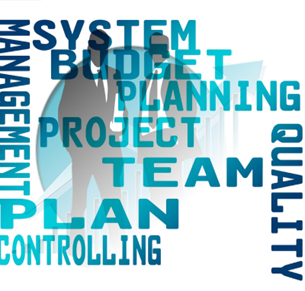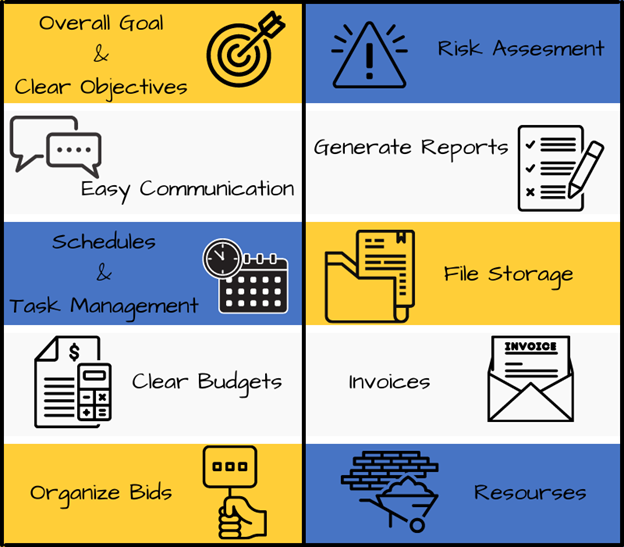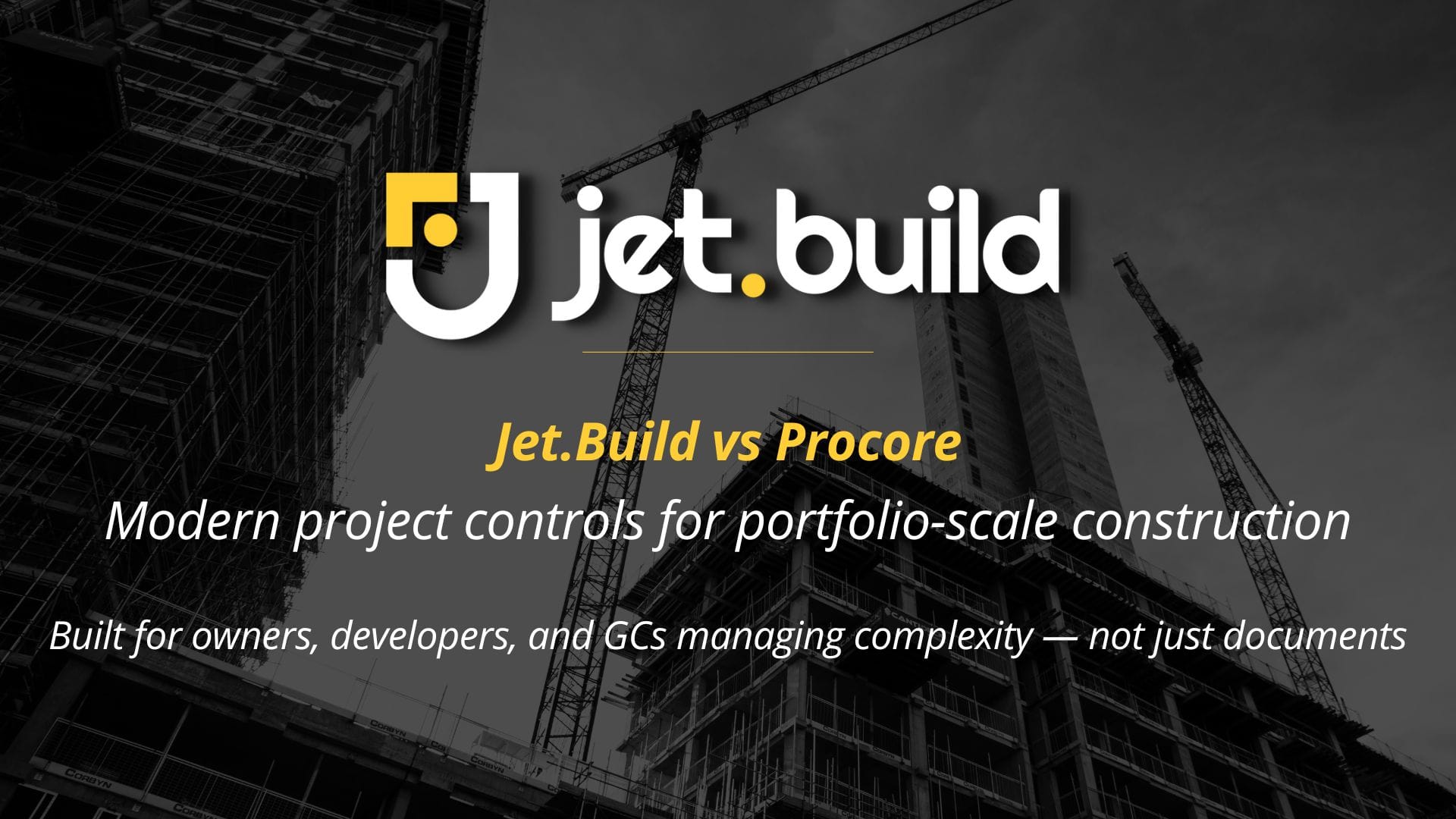Project Planning For General Contractors
There is one thing every administrative assistant in the construction field wants to avoid; An angry boss!
Something that is easily avoided, yet also guaranteed to annoy boss-man Bill, is when a building project goes haywire due to poor planning and sub-par organization. And, if we’re being completely honest, they have a right to be miffed when these things happen.
Planning every detail of a project may sound like overkill, yet in reality, it’s the best way to ensure a project is successful. So, how do you plan a construction project like the experts?
By building a solid plan foundation that will map out all the key areas of the job. A well-built plan will keep all the details in play, keep the entire team organized, and best of all, keep your boss happy.
Today, I will share ten planning tips for construction projects brought to you by the experts. Keep scrolling below for more information...
The Importance Of Construction Planning
I’ve worked behind the scenes on construction projects for years, and like you, I know how important it is to be prepared for all eventualities. Planning is preparing to fail, right? When you already have an answer in place when something goes awry, you can move past it without affecting the outcome of the job.

That’s not all, though. A solid plan is important for many reasons:
- Identify main goals
- Provides communication between project personnel
- Compares bids and budgets
- Highlights deadlines
- Reduces risk
- Prioritizes tasks
- Tracks Invoices
- Highlights RFIs & NCRs
- Scheduling
- Provides daily reports
- Allocates tasks
- Summarizes job phases
This, of course, is only the tip of the iceberg. Project planning in the construction, development, builder, or any type of contractor field, is essential.
10 Expert Planning Tips For Construction
Not only have I planned and mapped out numerous construction projects, but I’ve also been privileged to work with some of the best in the business! Watching how they plan and organize projects has helped me stay on top of jobs whether they are big...or really big.
Although I’ll go into detail on each one below, let’s take a quick look at the ten areas your planning foundation should include.

1. Create Goals and Objectives
When starting to plan a new project, it’s important to set up clear goals and objectives. This is crucial for everyone involved in the project. The main goal is typically self-explanatory, but the individual objects also need to be outlined. For example, if you’re paving a supermarket, objectives may be to clear the area, contact digs safely for the location, gain permits, pour the asphalt, and line the parking lot. Outlining these aspects of the job will help with scheduling, task management, budgeting, and the timely completion of the project.
2. Set Up Communication
Communication is paramount for all construction projects. As the project manager, you will need to communicate with the manager, crews, subcontractors, investors, clients, and many other individuals connected to the job. Your plan should have clear communication channels for everyone. While not everyone will require access to the entire plan, it’s important that team members know where to look for specific information.
3. Create Schedules With Task Management
As I mentioned in the first tip, most jobs are going to have individual objectives that have to be met. Not only that, but you can’t have the paint crew going into paint lines prior to the pavers laying down the asphalt. To keep the project moving in a timely manner, a realistic schedule needs to be created along with tasks that can be assigned to specific people. This is also where communication also plays a role. Each member of the team will need access to the schedule and their tasks. Schedules, or lack thereof, are one of the best ways to devastate a contractor’s budget.
4. Specific Budgets
Ahh, the budget. One of the easiest ways to make or break a construction job. I will refrain from going through all the reasons why a budget is so important because I’m sure you know them already. What’s important here, however, is creating a clear budget with line items for each category. A contractor or manager should be able to clearly see how the project is doing, where improvements need to be made, and projections for the finished job. You also want your budget to include bids and other source information for saving resources.
5. Organize Bids
This speaks to the point above, and it works right along with the budget. On large-scale building projects, you will need to keep track of numerous bids. Although you don’t want anything to fall through the cracks, you want to focus on comparing bids. If you are able to compare bids from other jobs, even better. When planning out the project, an easy-to-read bid page will go a long way to keeping the job in the black.
6. Plan for Spotting Risks
The better your planning, the easier you will spot risks. Risk assessment is an often overlooked priority for admins and project managers. Be that as it may, you should make it a top priority. You may not be able to see every diversion, but when you have a good plan in place, it allows you to move with the changes without affecting the entire project.
7. Daily Reports
There are a lot of areas to cover with a construction project plan; obviously. It’s important to remember that a lot of contractors, builders, etc won’t have time to navigate the entire game plan, which is why daily reports are essential. You want to set your reports to include many different criteria depending on where it’s going. Showing the progress made on a project will let managers make changes to the schedule, scope of work, budget, and resources to keep the job moving in the right direction.
8. Create File Storage
This is another area that is often devalued when planning a project. Creating space for shared files, downloads, pictures, permits, contracts, and other items should be part of the foundation you build. Many projects require pictures after each objective, permits for specific work, or rental agreements for equipment. Having to look for these items can waste time and slow down the progression of a job. Keeping files in the same place where they are easily accessible for those who need them will make the work that much smoother.
9. Invoices
We all know how important invoices are to the bookkeeping squad, but you also want to keep track of them for the purposes of the project’s budget. You also want to make sure invoices are paid on time, scope creep is recognized quickly, and there is no overspending that can be eliminated. While invoices are part of the budget’s bigger picture, your plan should make them visible on their own whenever needed.
10. Resources
The last aspect of our expert planning model for construction projects is resources. Very few (if any) jobs are possible without some kind of resources. Again, it can be argued that this is part of the budget; which is true. That being said, like invoices, it should have its own part of the overall plan. Aspects such as where the resources are coming from, quantities, cost, and delivery time are all important. Resources can also include rented equipment, lunches, meeting spaces, experts, subcontractors, or anything else the project needs.
Pro Tips
If you are new to project management or the construction field, the tips above may seem daunting. Once you start implementing these planning techniques, however, you will find your projects run a lot smoother than they otherwise would.
To really stand out when planning and organizing your next project, take a look at these additional pro tips:
- Make space in your plan to document and control RFIs and NCRs to stop anything from falling between the cracks.
- Create a contact list for your project. Although it may seem trivial, having a list of each person’s cell phone, work phone, and email will help you save time.
- When planning your invoice structure, make payment tracking part of the system. While you want to make sure you are paying your invoices on time, you also want to track the project’s incoming payments, as well.
- Create specific plan criteria including manpower logs, equipment logs, weather reports, and anything else that is relevant to the job.
- When planning for a job, you want to be able to transfer line items from one job to the next. This will save a lot of time; plus, you can compare costs from other similar projects.
- Stay organized and save money and time by using powerful construction management software. Jet.Build is a great option that gives you








